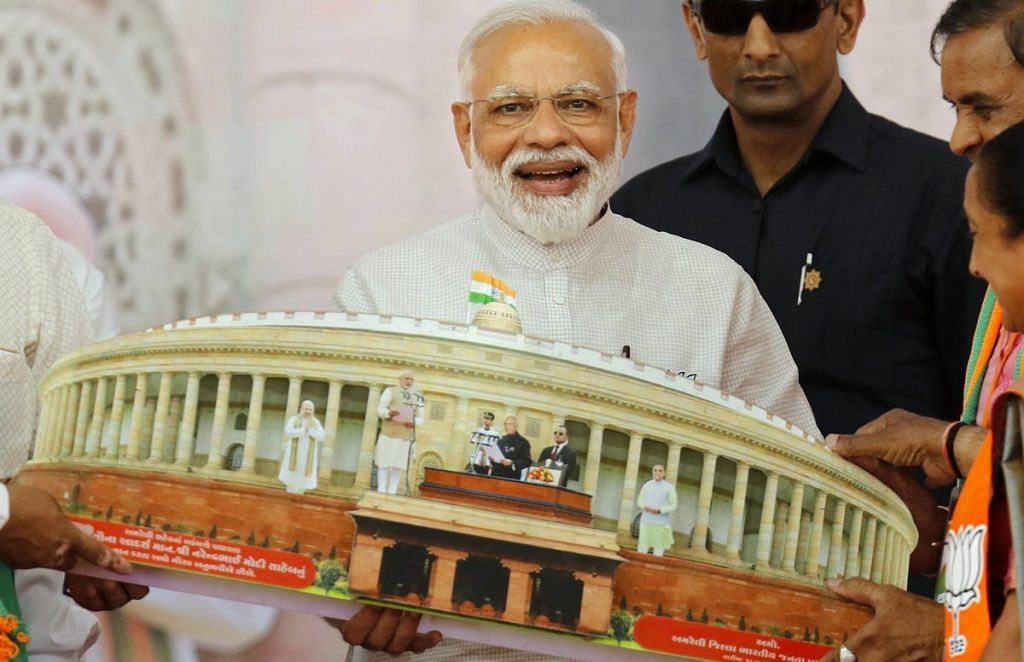This may be a bad time to champion the cause of lawmakers in India. It’s not just the revolting sight of the members of Karnataka or Goa assemblies bargaining away personal ethics and public morality for ministerial berths.
The MPs and MLAs have hit the headlines for all the wrong reasons in the past two months: a BJP MLA hitting a civic official with a cricket bat in Indore; a Congress MLA leading a mud attack on a deputy engineer of the NHAI on Mumbai-Goa highway; a BJP MP’s associates attacking a toll plaza employee in Agra; a BJP MLA’s daughter alleging threat to her life from the father for marrying a Dalit; and a former BJP MLA threatening to spill a chief minister’s blood.
The questionable conduct of these few, however, can’t be the yardstick to judge all lawmakers, most of whom have public interests in their hearts and minds. Each of them represents a million or more people but, contrary to common perception, wields little power where it matters – in Parliament. They make laws, but only technically. They speak, but as per a script. Their words and actions must follow their party lines.
Also read: In a rush to pass bills, 17th Lok Sabha is not scrutinising future laws enough
There was one forum where they could, to a certain extent, speak their minds – the parliamentary committees. But, with just a week left of the first session of the new Lok Sabha, no department-related parliamentary committees are in place. The Finance Bill, demands for grants, and Appropriation Bill have been passed by the Lok Sabha and are set to be passed by the Rajya Sabha – all without any legislative scrutiny.
Over half-a-dozen other bills have been passed without such scrutiny. The government is now preparing to push some controversial bills, such as amendment to the RTI Act, when there are no standing committees to raise the red flag, if needed.
When Congress leader Anand Sharma stressed the need for legislative scrutiny of important bills in the Rajya Sabha last Thursday, Union minister Piyush Goyal dismissed his objections, citing Narendra Modi government’s “track record” vis-à-vis the previous regimes. Poll-battered Congress legislators didn’t have the will to fight on.
It’s the Narendra Modi government, and not Parliament, that is virtually making laws. The government brings the bill. MPs make customary speeches as per their party lines. Opposition MPs point out lacunae, if any, which are brushed aside. The bill is passed, mostly by voice vote. Voting, if any, is symbolic. The message is clear: A government with such a brute majority can’t make mistakes. Rajya Sabha’s approval is no longer a concern as regional parties scramble to be on the side of the Treasury Benches.
That’s why the lawmakers in New Delhi should be thankful to their brethren in Bengaluru. Their experiments with loyalty have brought the focus back on anti-defection laws, especially the party whip.
Also read: What an Indian law can do to MLAs defecting in Karnataka & Goa – nothing
Way back in 2010, Congress MP Manish Tewari had moved a private member’s bill in the Lok Sabha to amend the anti-defection law to free parliamentarians from the fear of disqualification for taking a line independent of the party in all matters, except votes of confidence and money bills that concerned the government’s survival.
Tewari was a first-term MP then, and had a lot of fire in his belly. A majority of MPs agreed with him, though strictly off-the-record. They all felt the tyranny of the party whip that forced them to vote as their party dictated and not as per their own conscience or judgement based on merit and reasoning.
In 2016, Tewari wrote in a signed article: “Thirty-one years after the 1985 law, perhaps the time has come to assess as to how this statute-imposed morality squares up against a legislator’s right to vote according to his conscience, convictions, common sense and constituency concerns.”
The world’s largest democracy should probably take a tip or two from arguably the oldest democracy, the US. Last week, four Republicans voted with Democrats for a motion condemning President Donald Trump’s “racist” language against four Congresswomen. Last month, too, four Senate Republicans had voted with the Democrats to check Trump’s war powers. Think of a BJP lawmaker voting against a bill in the Lok Sabha.
So, when Prime Minister Narendra Modi warns BJP MPs against absenteeism during the Parliament session, not many see much merit in it.
The empty seats in both the Lok Sabha and the Rajya Sabha last Friday afternoon certainly didn’t show any defiance of the Prime Minister’s warning; it showed what the parliamentarians think about their role in legislative business.
Manish Tewari is back in this Lok Sabha after a medically forced absence from the last one. It’s probably a good time for him to revive his old bill and test the waters again. The Prime Minister is known to respond positively to well-intentioned ideas and suggestions. He may probably see merit in empowering the lawmakers to express their ideas and exercise their rights freely when it comes to making laws.
Also read: From India to Israel, laws are chipping away at democracy around the world
As for the other aspects of the 10th Schedule of the Constitution, we have umpteen examples in the past 34 years that show how political loyalty and morality can’t be enforced by law. Let the voters decide their fate.
